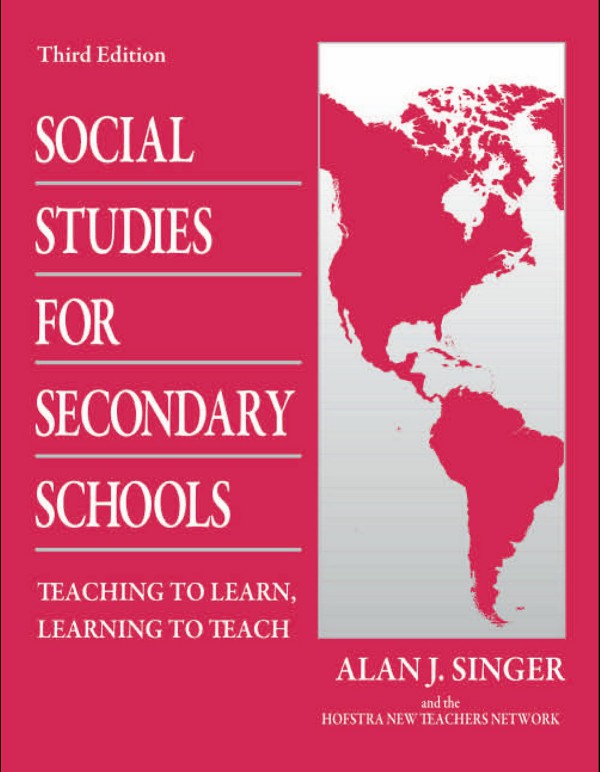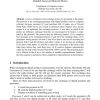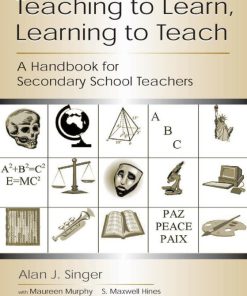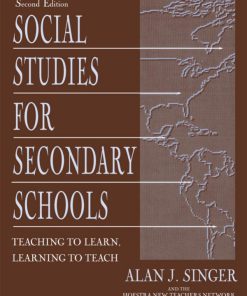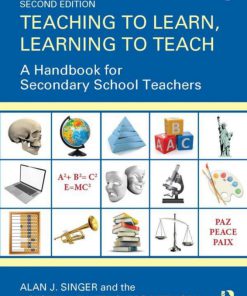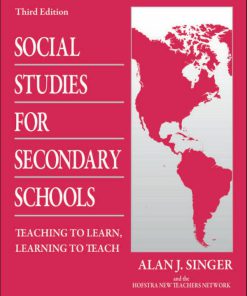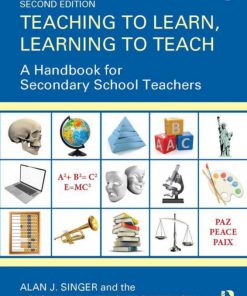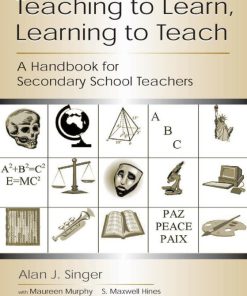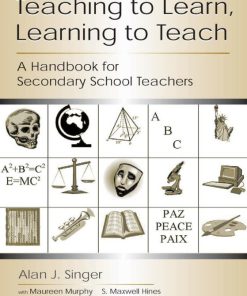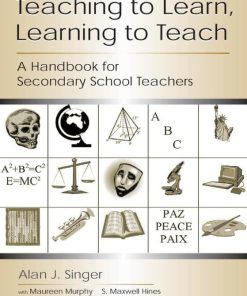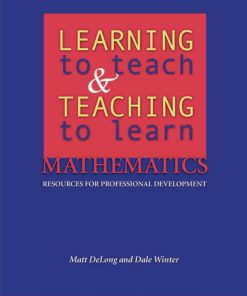(Ebook PDF) SOCIAL STUDIES FOR SECONDARY SCHOOLS Teaching to Learn Learning to Teach 3rd Edition by Alan Singer 0805864466 978-0805864465 full chapters
$50.00 Original price was: $50.00.$25.00Current price is: $25.00.
Authors:Alan J. Singer , Series:Education [174] , Author sort:Singer, Alan J. , Languages:Languages:eng , Published:Published:Jul 2008 , Publisher:Rouledge , Comments:Comments:Education, Politics & IR, Sociology & Social Policy
SOCIAL STUDIES FOR SECONDARY SCHOOLS: Teaching to Learn, Learning to Teach 3rd Edition by Alan J. Singer – Ebook PDF Instant Download/DeliveryISBN: 0805864466, 978-0805864465
Full download SOCIAL STUDIES FOR SECONDARY SCHOOLS: Teaching to Learn, Learning to Teach 3rd Edition after payment.
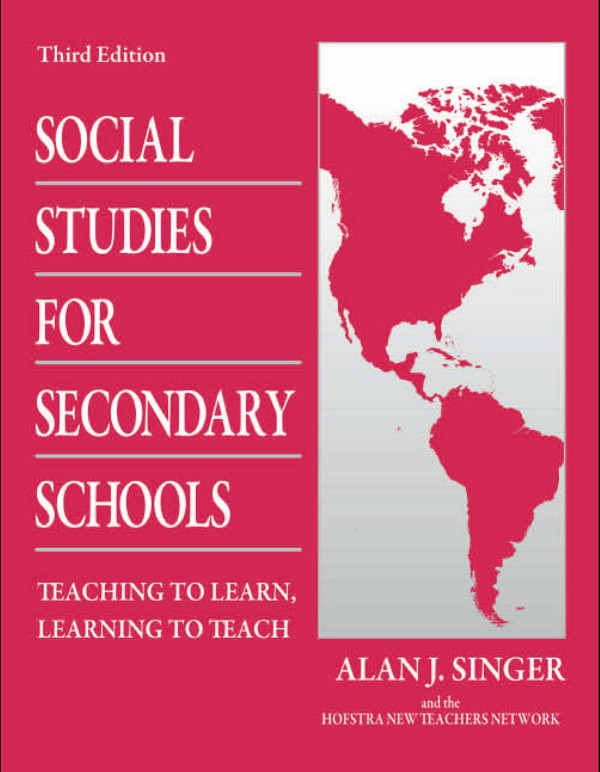
Product details:
ISBN-10 : 0805864466
ISBN-13 : 978-0805864465
Author : Alan J. Singer
This popular text advocates an inquiry and activity-based view of social studies teaching that respects the points of view of students and teachers. Based in practice and experience, it offers systematic support and open, honest advice for new teachers, is conversational not pedantic, and provides lots of examples. While the structure and most of the topics remain largely the same as before, this Third Edition
SOCIAL STUDIES FOR SECONDARY SCHOOLS: Teaching to Learn, Learning to Teach 3rd Table of contents:
Chapter 1: Who Are We?
Who are we?
Who am I?
What was student teaching like?
Why did I become a teacher?
How do you “figure it out”?
Who were the influences on my philosophy of education?
What is a teacher educator?
How do you open the school year?
Part I: Thinking about Social Studies
Chapter 2: Why Study History?
Why teach social studies?
Why study history?
What is history?
What is a social studies approach to history?
How can I learn more history?
What are historical facts?
What is the difference between fact and theory?
How does an historian study history?
How do historians resolve disagreements?
Should a teacher also be an historian?
How do you teach controversial topics?
Is the study of history scientific?
Are there laws that govern history?
What are the goals of historians?
Chapter 3: What is Social Studies?
What are the social sciences?
How did the social sciences become social studies?
What do we learn from the social science disciplines?
Chapter 4: What are Our Goals?
Why have goals?
Are we teaching subject matter or students?
What is important to know and why?
Who are our students and how do we connect to them?
What use is educational theory?
How can we teach democracy?
How are goals reflected in different approaches to teaching social studies?
What are the traditional academic goals in social studies?
How do teachers integrate goals into classroom practice?
What are the state standards?
Why are state standards sometimes so politicized?
Chapter 5: Is Social Studies Teaching “Political”?
Is everything political?
Why was the debate on national history standards so heated?
Should teachers express their opinions in class?
Why is defense of academic freedom important?
Should teachers encourage students to work for social justice?
How can classroom teachers empower students?
How do teachers translate educational theory into social studies practice?
What does a classroom based on transformative principles look like?
Chapter 6: How do You Plan a Social Studies Curriculum?
What is a curriculum?
How does a curriculum help teachers make decisions?
How is a social studies curriculum organized?
AP, IB, or Dual Enrollment Programs?
Which version of history?
How do you plan and use a curriculum calendar?
Part II: Preparing to Teach Social Studies
Chapter 7: How do You Plan a Social Studies Unit?
Why plan units?
What is important to know and why?
What should be included in a unit plan?
Where should teachers start planning?
How do social studies teachers plan units?
How do teachers use plans effectively in the classroom?
How can social studies curricula address differences among students?
What does a unit that focuses on content look like?
How is a document-based thematic unit organized?
What is a comparative thematic unit?
Chapter 8: How do You Plan a Social Studies Lesson?
Why have written lesson plans?
What does it mean to plan a lesson?
Why are there disputes over lesson planning?
What do students understand from a lesson?
How do lesson plans reflect ideas about learning?
What do beginning teachers worry about?
What should beginning teachers consider when planning lessons?
What are the ingredients of an activity-based lesson plan?
How is an activity-based lesson organized?
How is a developmental lesson organized?
What does an “outcomes-based” lesson plan look like?
Does the “workshop model” make sense in secondary schools?
How do you translate your plan into practice?
How can you introduce a lot of information in one lesson?
Chapter 9: What are the Building Blocks of an Activity-based Lesson?
How can lessons actively involve students in learning?
What is document-based instruction?
How do teachers organize social studies activities?
How do teachers open an activity-based lesson?
Motivations with transitions
When should students work in cooperative learning teams?
Are there perfect questions?
How do teachers assess what students learned?
How can teachers reinforce student understanding?
Are activities always appropriate?
Part III: Implementing Your Ideas
Chapter 10: How Can Social Studies Teachers Plan Controversy-centered, Thematic, and Interdisciplinary Units?
How should controversial issues be addressed in social studies curricula?
Why teach thematic units?
How do you organize a controversy-centered, thematic curriculum?
How should we deal with sensitive topics?
Should thematic units focus on particular social groups?
How can different subjects be connected in the social studies classroom?
Interdisciplinary ideas for social studies classrooms
Chapter 11: What is a Project Approach to Social Studies?
How do you include projects in social studies curricula?
What are the advantages of a project approach to social studies?
Chapter 12: How Should Teachers Assess Student Learning and Our Own Practice?
Does assessment equal learning?
What do the tests actually measure?
Why should educators assess student learning?
How can testing become part of learning?
What do teachers want to measure?
What does a social studies portfolio look like?
How do teachers design fair exams?
How do we move from instruction to assessment?
How can teachers grade fairly?
Should students be involved in assessing their own learning?
How are student teachers and new teachers evaluated?
Chapter 13: What Resources Exist for Social Studies Classrooms and Teachers?
How should teachers respond to the artificial intelligence debate?
Is online instruction the wave of the future?
How can you develop your skills as a social studies teacher?
How useful are computers in social studies classrooms?
How do you plan field trips?
Should I show my class a movie?
What can I copy for my class?
How do you find a job?
People also search for SOCIAL STUDIES FOR SECONDARY SCHOOLS: Teaching to Learn, Learning to Teach 3rd:
social studies topics for secondary schools
social studies for bahamian secondary schools
social studies high school courses
social studies topics for 2nd grade
social studies syllabus for primary school

